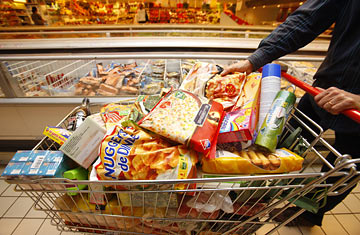
Glimmers of hope keep sneaking through the world's cracked economy. The Conference Board's index of leading economic indicators, which includes measures such as stock prices, the money supply and new orders by manufacturers, just posted its first gain in seven months. Consumer confidence increased in May and is now at its highest level in eight months. According to a survey by the National Association for Business Economics, over 90% of economists are predicting that the recession will end by December. (See TIME's recession photo-essay "Stores That Are No More.")
Add one more for optimists. On May 27, WSL Strategic Retail, a highly respected consulting firm, released its latest "How America Shops" survey. The company found that in 19 of the 32 spending categories it tracks, fewer consumers are cutting purchases now than they were a year ago. For example, last year 58% of the survey's respondents said they were cutting back on purchases of frozen food. Now only 34% said they were spending less on those items. Last year, 41% of consumers said they were cutting back on cereal. That figure has now dipped to 26%. (See pictures of the world's longest yard sale.)
The data is based on a nationwide survey of 1,500 shoppers. The improvement in consumer sentiment extends to more than just food. In May 2008, for example, 50% of shoppers said they were spending less on skin-care products. This past April, 38% were cutting back. People are also cutting back less on over-the- counter medication and clothes, which is particularly good news for the many apparel retailers that have been battered by the recession. Of the 13 remaining categories that WSL Strategic Retail tracked, not one showed a significant increase in the percentage of consumers cutting back. In each of these cases, the levels were essentially flat.
So what's the takeaway from this data? First, some recession fatigue has set in. "People have done an awful lot of cutting back in the last 18 months," says Wendy Liebmann, CEO of WSL Strategic Retail. "There's not much more they can do. They've figured that it's not the end of the world here, and there are places where you can open up your wallets." She points to another stat: 1 in 4 of the shoppers WSL surveyed said they were "tired of watching every little penny and are ready to break out a little." The top categories they desire: a vacation, a night out and clothes for spring and summer. Remember all that cocooning everyone talked about a few months ago? Perhaps people are getting bored indoors. "Consumers are exhausted, and they need a little break," says Liebmann. "They are starting to come out of their little burrows, saying, 'Please, please, can I have a night out?' "
No one is more fed up with the recession than Christina Calleja, 25, a real estate broker's assistant in New York City. Over the past year, she has fretted over every single expense. She has stayed home on Saturday nights and refused to eat out. Instead of buying a lotion that would smooth her skin, she would sample one at a department store. "Psychologically, obsessing over everything you buy is so exhausting," says Calleja. "Everyone talks about the recession everywhere you go. It's always in your face. It gets annoying."
So, tired of her wicked case of cabin fever, Calleja has gone on a "crazy rampage." She saw a $500 flight for a weekend in Paris and snapped up the ticket. "And of course, you need to buy a new outfit for Paris," she says. She has even convinced some friends to go with her. "I just said, 'Screw it — I'm going to go here.' " She is also going out more and spending a bit more on basic staples. "I got tired of being poor," Calleja says. "At some point, you have to get back your sanity."
In what kind of shape will the rampage leave Calleja's checking account? "I"m still in the hole, but I feel O.K. about my spending — kind of, sort of," she says. Since she works in the real estate business, her job isn't safe. Still, she says, "you just have to delete that from your mind." This week, she'll start a part-time tutoring job to make some cash on the side. "Bottom line, you just have to keep living your life," she says.
Liebmann is quick to stress that her data and stories like Calleja's don't predict a recovery. "It's just a lesser negative," she says. Job anxiety remains a powerful brake on consumer spending. Unemployment is high — 8.6% — and the WSL respondents are worried: last year, 20% said they were concerned that they or someone in their family might lose a job. This year, that figure jumped to 35%. That fear keeps cash in the pocketbooks; for the first time in a decade, the personal savings rate has been above 4% for three straight months.
Given all that, what do WSL's consumer psyche measures say about the fate of the recession? "We see it more as the end of the beginning," says Liebmann. "There's a very big cloud still over the consumer. We've been through the first phase, and we hope the worst has happened. Shoppers are feeling a little bit chipper, but there's still more to go." Sure, additional economic tumult may be coming. But at least we can enjoy a little calm.
